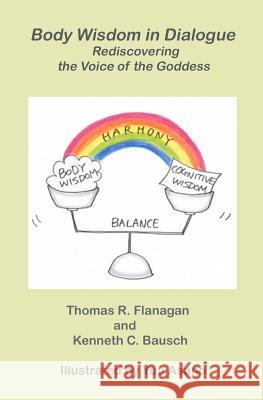Body Wisdom in Dialogue: Rediscovering the Voice of the Goddess » książka
Body Wisdom in Dialogue: Rediscovering the Voice of the Goddess
ISBN-13: 9780984526635 / Angielski / Miękka / 2012 / 170 str.
Did you ever stop to consider how magical, mystical, and genuinely spiritual the practice of dialogue can be? Not debate, of course. Debate is a win-lose contest, and it draws circles around winners and losers which divide us and foster ill will. I am speaking about the type of conversations - reflective deliberations - that we share with others in a circle of trust. Body Wisdom in Dialogue is a guide book for understanding the feelings that enable and sustain heartfelt discussions. Collective conversation is an ancient art which has been sustained within tribal cultures. For this reason, the book opens with a preface from the Americans for Indian Opportunities providing a view into the sacred dialogues of indigenous democracy. The first chapter reflects on the experience of thinking as individuals - which is a prelude to the phenomenon of thinking in groups. The same conditions that are needed for us to sort out complex understandings alone are needed as we sort out complex understandings together. The second chapter provides a brief history of the concept of body wisdom. The reductionist tradition of Western metaphysics comes under fire, in an honest and respectful fashion. And history comes full circle as Western sciences evolve the recognized need to once again engage complexity through inclusive community. A third chapter launches a reflective look at how we feel our way through moments of thought. When we recognize that philosophical mathematicians no less than Albert Einstein embraced this experience, we can find it easier to make peace with feelings which might seem to work against logic. Our feelings enliven our logic - challenging it for the purpose of making it more coherent - and in this sense our emotional presence is the basis for our creativity, understandings, and self discovery - our deep beliefs, our mysticism and our faith. The fourth chapter speaks to the need and the mechanism for linking body wisdom (our emotional presence) with cognitive wisdom (our constructed understandings) through dialogue. A case is made that collective reflection links us at deep levels. Dialogue allows us to democratize deeply held feelings. Collective consciousness is introduced in the fifth chapter. Conscious thinking includes learning and also remembering what is learned. Some of what we have learned is carried within us as individuals, some of what we have learned is carried among us as stories, and some takes expression in the world around us. The process is sometimes rushed. Much that mankind has done in the world has left voices out of the discussion. Inclusive dialogues - which raise collective consciousness into collective action - must move at a pace that allows the group's collective body wisdom to connect with its collective cognitive wisdom. Specific examples are provided in this chapter. The sixth chapter reaches back to antiquity to connect with a myth from the classical Greek era - the contest constructed by Aphrodite (representing prevailing power and wisdom) for Psyche (representing an emerging presence) in determining a romantic outcome (representing, we propose, the future of man). Psyche's ordeal is a metaphor for the ordeal that we face when we are engaged in inclusive, complex dialogue. A final chapter provides a glimpse of ways that large groups can fuse body wisdom with cognitive wisdom. Dialogue can leave participants with an enduring feeling that they have participated in a sacred event - that they have summoned the sublime presence of a collective wisdom. The authors do try to walk this line lightly; however, Body Wisdom in Dialogue does not side step the need for an appropriate approach to dialogue for dealing with our most pressing civic situations. Body Wisdom in Dialogue: Rediscovering the Voice of the Goddess is the second AGORAS publication by Thomas Flanagan and Ken Bausch. It follows last year's book A Democratic Approach to Sustainable Futures.











